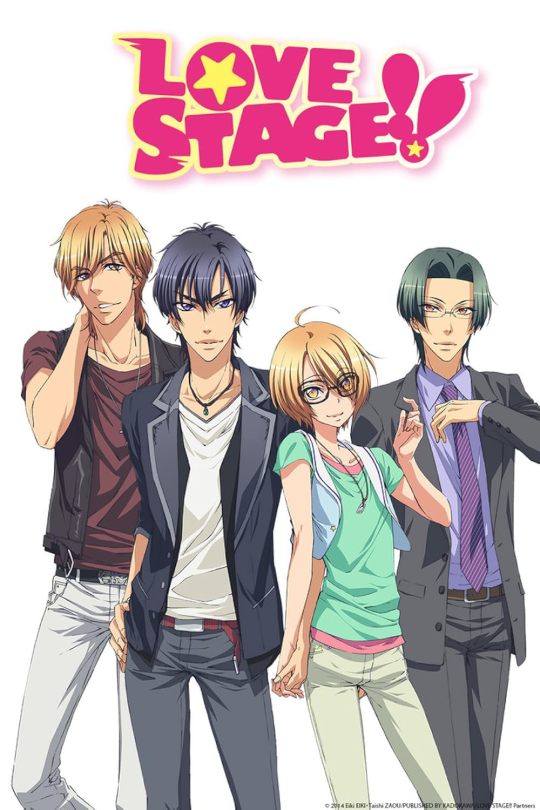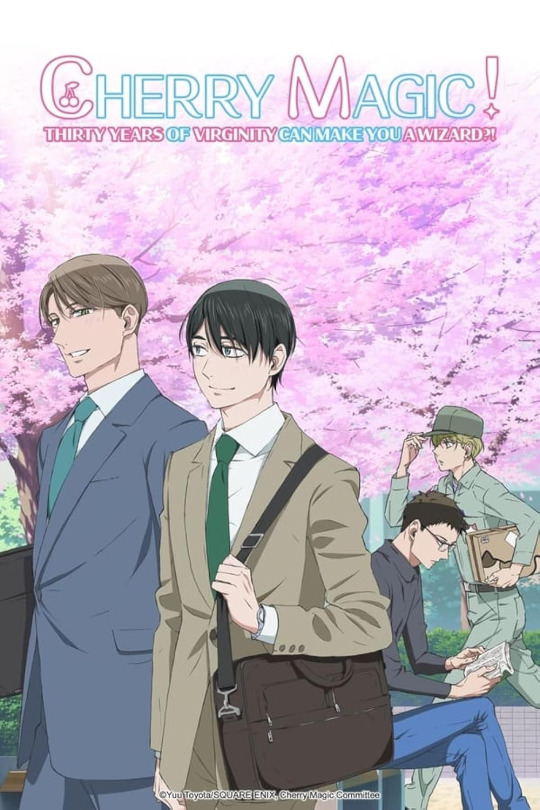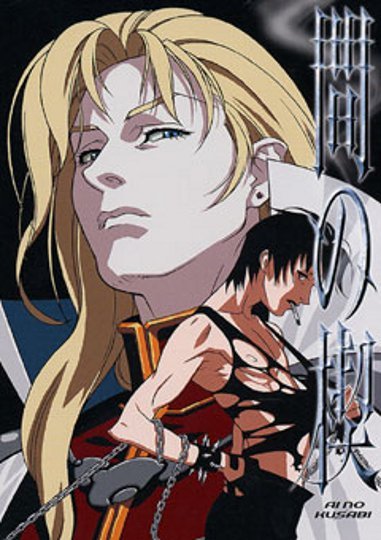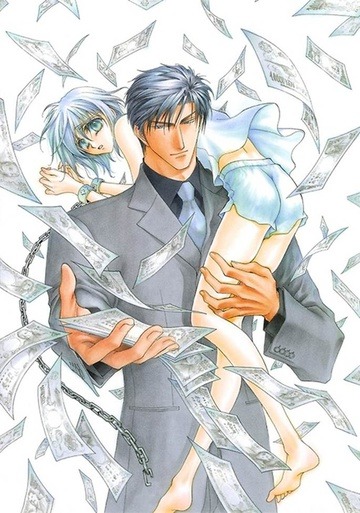#okane ga nai
Explore tagged Tumblr posts
Text








LGBT/Yaoi Anime Series
Fair Warning: These animes may contain sexual content.
#Yuri on Ice#Love Stage#Ai no Kusabi#Loveless#Fujimi Orchestra#Cherry Magic#Sasaki and Miyano#Okane ga Nai#Anime#Moments#LGBT#INTENSE Anime!!!#Very Strong Very Intense and VERY Intimate!!!
130 notes
·
View notes
Text
BL: Romancing in a Bubble?
As always, please let me know if you have suggestions, critiques, comments or corrections.
I will only be discussing BL broadly (here I use BL as an umbrella term) and not just live action. I don’t want to club together BL and GL since in spite of their shared roots they are very different in their genre conventions, target demographics, and history. Also, I am not very familiar with it.
youtube
I consider BL a genre in itself – practically well as the way Masala is a cinema genre.
Please check the content/trigger warnings before diving into the works I have mentioned below. Feel free to message or ask.
BL / romance
I don’t think BL is romance or even a sub-genre of romance. A lot of BL is romance. Many more of them have at least a romantic side to them. There is enough overlap between those genres to give the impression that BL is romance. (I remember the discussion Killing Stalking had prompted.)
But there are plenty of BL devoid of romance. Like One Room Angel, Social Reform Season, and The Orc Bride. Similarly, BL is not exactly a porn sub-genre even though there are plenty of ero-BL.
Also, there are plenty of BL where romance takes backseat such as The Night Beyond the Tricornered Window, Blue Morning, Brother, Lawless Gangster and Thousand Autumns.
BL / queer
Queer – Can I call it a genre the way I call BL a genre? Even if one were to ignore queer as method in academia, it is still so complex.
Let me quote Taiwanese tongzhi (queer) author Chiang-Sheng Kuo:
[W]hat exactly is queer literature? Is it queer literature if queer people like to read it, or is it only queer literature if there are queer characters in the books? Or is it an appendage of the queer movement? If a queer author writes a book without queer characters, does that represent a certain aspect of queer culture?
(You can find the whole interview here.)
I think the problem persist even when I think of queer as a label.
Then there is the issue with conception of “queerness” itself. Like, in a way it is a limiting term. Is it fair to call normative or customary male-male erotic practices such as masti and Launda Naach, “queer” just because that’s how it is perceived elsewhere now?
To quote what Kaustav Bakshi wrote in Writing the LGBTIHQ+ movement in Bangla:
In the last decade, the question of decolonizing queer epistemologies was being raised periodically, whereby queer politics, despite having a shared agenda of toppling heteronormativity, and queer culture, albeit having a shared aesthetics, became more and more regionalist – not in a negative sense – but, with implications of difference, which can be interpreted and understood only when one subjectively experiences the ‘region’ with respect to gender, class, caste, ethnicity, physical and intellectual ability, access to education, metropolitan cultures, and most importantly, the internet.
[T]he attraction towards the launda is not understood as ‘queer’ – non-normative or out of the ordinary – but, as an integral part of sexual life, which is not always compulsively alert to the heterosexual-homosexual binary.
Imo, decolonizing queer epistemologies comes in handy when discussing BL since there are plenty of BL dealing with:
Historical BL set in eras and locations that had customary male-male sexualities and practices.
BL with special settings, like omegaverse, with different (if any) idea of queerness.
BL / other queer content
Just as Japan has gei-comi, and other manga like Shoujo Manga Artist Minamoto-San Comes Out, and Kieta Hatsukoi (shoujo), What Did You Eat Yesterday and My Brother's Husband (seinen) beside BL manga, different countries offer diversity in queer content with noticeable overlap. But clubbing them together would not be easy. Moreover, this diversity is as much cross-sectional as it is temporal (tanbi, JUNE, shonen ai, yaoi, BL in Japan).
BL the main difference between BL and other queer genres is BL’s focus on moe (affect). Anyway, BL predates LGBTQ+ acronym. It predates de-pathologization of homosexuality in many BL creating regions. Fu-people (BL fans) were creating BL before mainstream media started representing queer people in media. Fu-people battled state and its censors everywhere along with queer people. Live action BL is commercialized and we get mostly feel-good content. But that is capitalism (and the State) reaping the dividends of decades of fu-people’s labor of love.
I wonder if it is apt to consider BL the way western queer shows (such Verbotene Liebe, Queer as Folks, Os Nossos Dias and SKAM) as benchmark when discussing BL? Won’t it be better to evaluate consider BL in relation to local non-BL queer content in BL producing countries? But then, there are BL inspired by western queer culture such as Partners by Tamaki Yura.
Here are three gei-comi that I recommend for BL audience, through which they can get an insight into non-BL queer manga from Japan (created with androphilic men as target audience) :
Fire Code by Ichikawa Kazuhide
Fisherman's Lodge by Gengoroh Tagame
Coming Home by Go Fujimoto
Here is my BL versus gei-comi list which I think highlights their differences and similarities (I have included only Gengoroh Tagame’s works since they are probably the easiest to access/buy/borrow):
Do You Remember South Island P.O.W. Camp? by Gengoroh Tagame || Hitori de Yoru wa Koerarenai by Matsumoto Yoh
Arena by Gengoroh Tagame || Jinx by Mingwa
Cretian Cow by Gengoroh Tagame || The Orc Bride by Madobuchiya (Nishin)
Uo to Mizu by Gengoroh Tagame || Terpenoid by Okadaya Tetuzoh
My Brother's Husband by Gengoroh Tagame || The Story of My Brother by Ike Reibun
There is lot of overlap between BL and gei-comi. Gengoroh Tagame first published in JUNE (a magazine that contributed to BL we know now). There are magazines and anthologies (Nikutaiha BL) that offer crossover between different streams of queer content.
Similarly, there are danmei (Chinese BL) novel written by queer men such as the autobiographical works: Six Records of a Floating Life and Waiting Until 35 Years Old by NanKang BaiQi and Bei Cheng Tian Jie (北城天街) by FeiTian YeXiang.
BL / Queerness - exploration and conflict
Here are some live action BL (I’m not including some of the more famous ones like TharnType and Wedding Plan) where plot is rooted in character’s queerness and its exploration or implications:
Lan Yu – first danmei to get live action adaptation. The central conflict is rooted in the queerness of its characters, particularly Chen HanDong.
A Round Trip to Love and Irresistible Love – based on danmei by Lan Lin. These are part of a shared universe. The former has both ‘coming out’ (Cheng Yichen) and ‘leaving home’ (Lu Feng). In the latter, all the conflict is rooted in compulsory heterosexuality and we get the perspective of not only an amphiphilic (bisexual) man (Xie Yan) but also an amphiphilic woman (Xia Jun) of the same social class.
Boys Love: The Movie
No Touching At All (2014)
Udagawachou de Matteteyo (2015)
The Cornered Mouse Dreams of Cheese
Sing in Love (2022) – Queerness is part of the main conflict.
Mood Indigo
Life: Senjou no Bokura
Light on Me
I don’t keep track of these things usually, so this is based off memory.
In Japan, most BL has dealt with the struggles of being queer in a largely heterosexist society since the days of tanbi and shonen-ai (such as Zankoku Na Kami Ga Shihai Suru by Hagio Moto). JUNE gained notoriety for focusing on it and yaoi boom was movement away from that. Then yaoi gained notoriety for existing in a bubble. When BL started to treat heterosexism in society as a part of the narrative, it garnered praise for being ‘transformative’.
BL has managed to carry within it different modes of identity and queerness.
Take Okane ga Nai (No Money) by Hitoyo Shinozaki and Toru Kousaka for example.



It is often held up as the epitome of all that is wrong with BL (or yaoi as anglophone fandom calls it). What’s less talked about is the main character, Ayase Yukiya’s queer angst and his exploration of identity that spans several volumes of the manga series. Kano on the other hand doesn’t struggle with his identity at all since his attraction to Ayase is driven by a very strong, initially unreciprocated emotional connection dependency (formed when his father died and he was at his lowest). For him, sexuality is merely a form of expression of his attraction for Ayase. Therefore, it does not inform his identity in anyway.
Within cannon, Someya and Honda’s pairing offer contrast to Ayase and Kano’s pairing. In a way, Kano and Someya have post-queer and pre-queer identities, respectively. Someya is a self-actualized person who mentors other queer characters (club staff, Ayase, Honda, Kano). There is a lot of give and take that happens between Ayase and all the queer people he meets at Someya’s club. Ayase's and Honda’s struggles with identity and sexuality are juxtaposed with Kano's and Someya's self-assured disposition.
That is also why I don’t think I Told Sunset About You stands out much. It can easily fit into the BL fold because there are plenty of BL that approached the same theme as I Told Sunset About You in a similar fashion (including these live action BL: His - Koisuru Tsumori Nante Nakatta, Life: Senjou no Bokura and The Cornered Mouse Dreams of Cheese).
I recommend the danmei novel Sissy by Shui QianCheng, the author of the works Beloved Enemy, My Stand-In and Meet You at the Blossom are based on, for a more detailed exploration of heterosexism, including femmephobia and homophobia.
Sissy, Beloved Enemy and Professional Body Double (the novel My Stand-in is based on) are all part of 188 group (a shared universe of novels).
There are plenty of other BL from other region that are focus on themes such as heterosexism and compulsory heterosexuality. Here is such a one-shot: Romantic by Motoni Modoru (part of the anthology Tanbishugi).
BL / terms
I like BL and associated terms like danmei because of the culture and the history associated with those terms. Tanbi and danmei are different readings of same characters 耽美 but they represent very different things. Shonen-ai literally translate to boy(s) love but that term (or BRM (boys’ romantic manga) as Emiko Nozawa puts it) carries within it so much history and specific artistic styles and sensibilities. Waai is derived from yaoi/yuri but there are fu-cultural processes, very different from that of yaoi creation, behind the production of Y-novels. I learned a lot from exploring these words alone.
#japanese bl#korean bl#thai bl#bl meta#ql meta#homophobia#heterosexism#queer#queer media#queer culture#gei-comi#gei comi#bl recommendation#danmei#188 group#188男团#bl analysis#asian ql#ql dramas#I Told Sunset About You#itsay#no money#Okane ga Nai#multiple works mentioned#chinese bl#bl drama#asianlgbtqdramas#asianlgbtqmedia#bl series#bl novel
31 notes
·
View notes
Text


save me ayase yukiya from the classic yaoi manga okane ga nai..... save me
(also happy late bday, apparently o_0)
#yukiya ayase#okane ga nai#no money#yaoi#erixart#hello new followers. you came for fallout? TOO BAD. look at my twink boy
13 notes
·
View notes
Text

x
14 notes
·
View notes
Text
Literally every straight "romance" novel that gets Booktok/Twitter clout looks like this, but instead of Ayase, it's a short skinny cishet woman with brown hair

#star wars sequels were a mistake & brought naught but ruin to this planet#literature#romance#booktok#okane ga nai
37 notes
·
View notes
Text










Title: Okane ga Nai [manga à anime]
Author: SHINOZAKI Hitoyo
Artist: KOUSAKA Tohru
Genre: action, adult, comedy, drama, psychological, romance, yaoi
Synopsis [baka updates]: As a guarantee for his cousin, Yukiya Ayase was sold at an auction and was bought by Somuku Kanou, who runs a financial firm. Ayase struggles through the fact that he's selling his body in order to repay the debt.
Spin-off: Henshin Dekinai
Synopsis [baka updates]: Car mechanic and ex-yankee Honda falls in love with Someya, a beautiful okama. Someya promises to go on a date with him in exchange for free car maintenance. Someya planned to tease him since the mechanic was unaware of his true gender, but when Someya reveals the truth, Honda's attitude doesn't change one bit! And now Honda's acceptance has stirred up feelings of affection in Someya!
Chibi Scale: 5/5
#okane ga nai#yaoi manga#bl manga#yaoi anime#bl anime#no money#henshin dekinai#shinozaki hitoyo#kousaka tohru#i can't change#i can't transform
7 notes
·
View notes
Text

my bank account where my salary and savings go & the bank account where i transfer money for my everyday spending
19 notes
·
View notes
Text


17 notes
·
View notes
Text


okane ga nai reference in the year of our lord 2023
#the yaoiest of yaoi#what people who hate yaoi think it is#the amount of psychic damage received from the tweet... insane#i didn't even read the series#yaoi#bl manga#fujoshi#okane ga nai#no money#fudrilshi
24 notes
·
View notes
Text
Okay I've been watching a bit of yaoi anime and fair warning to anime fans, they are VERY... 😳🥵😳. I love and support LGBT relationships and yaoi animes get very intense, VERY quickly and just...😳🥵😳




#LGBT#My Thoughts#Anime#Love Stage#Ai no Kusabi#Fujimi Orchestra#Okane ga Nai#INTENSE Anime!!!#Very Strong Very Intense and VERY Intimate!!!
12 notes
·
View notes
Text
Rent-a-Girlfriend is to straight romance what Okane ga Nai is to yaoi & also what Citrus is to yuri
18 notes
·
View notes
Text
Toxic 00s yaoi, save me... save me, toxic 00s yaoi...
#i've been doing nothing but read the old toxic faves since like thursday#i ran out#i don't think i have the stomach for okane ga nai#the shota is too strong#and too little communication for too long#not *mutually* toxic enough either#just let them destroy each other not just onesided#i think antis are like that bc they're spoiled with all the modern BL#they need to indulge in some really fucked up shit and learn to appreciate what they have#read like... idk finder or okane ga nai and then look me in the eyes and tell me lawlu or ereri is criminal#katie does a talk
7 notes
·
View notes



